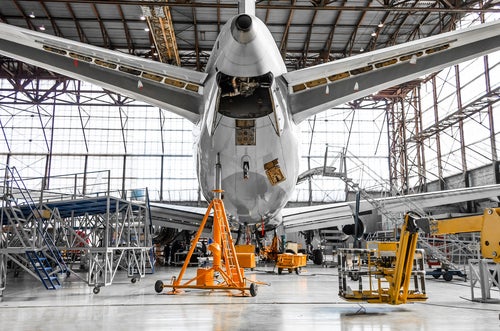
The worsening outbreak of Covid-19 over the first quarter of 2020 has had a significant and growing impact on international supply chains. Industry research company IBISWorld has put together an impact statement covering the remainder of 2019-20, and beyond.
-O-
Impact of Covid-19 on aviation leasing in the UK
Overview
- Air travel is likely to be affected in the current year due to the coronavirus outbreak, which has led to the cancellation of a significant number of flights thus affecting demand for industry services.
- The outbreak of the coronavirus will affect air travel and inbound tourism in the short term.
Sector outlook
The air transport equipment rental and leasing industry is expected to perform well over the next five years.
Although the industry is expected to be volatile, revenue is expected to grow strongly.
Rising demand for industry services is likely to be derived through growing tourism, especially outbound tourism. However, the outbreak of the coronavirus will affect air travel and inbound tourism in the short term.
The industry is expected to benefit from significant political and sporting events over the coming five years, to support industry growth.
How well do you really know your competitors?
Access the most comprehensive Company Profiles on the market, powered by GlobalData. Save hours of research. Gain competitive edge.

Thank you!
Your download email will arrive shortly
Not ready to buy yet? Download a free sample
We are confident about the unique quality of our Company Profiles. However, we want you to make the most beneficial decision for your business, so we offer a free sample that you can download by submitting the below form
By GlobalDataThe industry is expected to benefit from the major sporting events such and the 2022 football world cup.
Enterprise numbers are expected to rise over the period as profit margins increase during the coming five years.
However, trends in the airline industry to increase operational efficiency by extending the lifetime of aeroplanes through leasing newer parts rather than replacing aircraft outright is likely to increase demand for industry services, especially the engine product segment.
Industry revenue is anticipated to expand at a compound annual rate of 10.1% to reach £1.6bn over the five years through 2024-25.
Traffic and tourism
A number of notable political and sporting events are expected in the first half of the five-year period through 2024-25 which will increase demand for air travel and thereby lead to increased demand for air transport equipment rental and leasing.
An end to the free movement of people between the UK and the European Union (EU) will affect inbound tourism. The fast rate of growth in international tourists to the UK is expected to slow in the coming five years. However, outbound tourism by UK residents and international tourism is expected to rise as global economic conditions improve in the next five years.
Demand from tourism could significantly outweigh supply for many airlines, generating higher demand for rented and leased equipment. This would be especially prevalent during periods of significant international sporting events such as the FIFA Football World Cup in Qatar during 2022.
Airport and passenger traffic are expected to also benefit from rising disposable incomes and remain the largest markets for the industry in the five years through 2024-25.
Airports, in particular, present an attractive opportunity because there are fewer regulatory hurdles when renting ground support equipment.
This equipment is standardised to the planes it services rather than airports, so larger operators may be able to achieve economies of scale by purchasing in bulk to serve several airport clients.
Air passenger numbers could be significantly derailed by airlines cancelling flights due to a possible outbreak of the coronavirus which will affect demand for equipment.
Intrinsic volatility
The industry exhibits an inherent level of volatility.
This is due to a large proportion of demand being derived from the passenger and freight air transport industries, which are volatile as well.
The industry, and those in the same supply chain like the airports’ industry, struggle to get the maximum use out of their assets because they face cyclical changes in passenger numbers.
In addition, these industries also have periods during which demand for capacity exceeds what they can supply at existent investment levels.
The capacity gap is filled by additional equipment leased from the air transport equipment rental and leasing industry. Reasonably strong demand is expected to continue in the coming five years from both increase tourism numbers and general demand for airports as well as aircraft operators.
This is expected to continue to provide opportunities for industry operators to lease air transport equipment to fill supply gaps.
Market shift
There has been a shift in the broader aviation market away from replacing entire fleets and towards the less expensive option of updating individual components.
For example, an aircraft’s original engines can be replaced with more fuel-efficient models long before the fuselage or wings reach the end of their useful lives.
This has increased the technological intensity of the aviation industry and presents an opportunity for industry operators. Aircraft operators will compete to acquire the latest available equipment from suppliers to gain a competitive advantage.
Firms that rent and lease air transport equipment will face a growing need to boost their investment in equipment over the next five years.
Investment in new equipment is expected to weigh on profitability in the short term, however, industry profit margins are expected to register overall growth over the next five years.
New and existing operators are expected to benefit from investing in up-to-date equipment as they are able to charge high lease and rental rates.
Large operators such as Rolls-Royce are able to improve profit margins as they offer more fuel-efficient and technologically advanced engines at higher leasing rates.
Enterprise numbers are expected to rise at a compound annual rate of 3.1% over the five years through 2024-25 as margins trend upwards. This is anticipated to increase industry employment over the same period.







